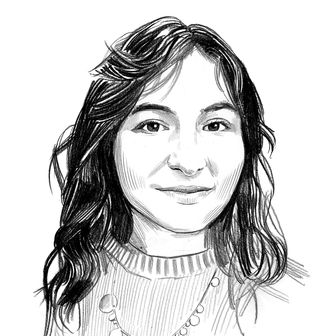
Swellness is a monthlong series exploring the health and wellness stuff no one talks about.
My boyfriend and I bicker over the curtains a lot. I like to keep them open at night and awaken to daylight flooding the room; he’d rather use an alarm clock and leave the curtains closed while we get ready for the day. The solution is that we alternate: Every other morning, I get to wake up in my little pool of sunlight, and on the other days, he gets to wake up his way. Like all compromises, this setup leaves both of us a little unhappy, and on the mornings when we wake up to an alarm in a darker room, I feel groggy, unmotivated, and cranky. Save chugging six cups of espresso every other day, I needed a way to stave off the darkness-induced dreariness without blinding my boyfriend with the sun.
I reached out to Mariana Figueiro, director of the Mount Sinai Light and Health Research Center, to find out what I should be doing. She told me to, um, just go outside — but not because my boyfriend got to her first. The thing about those open curtains, she said, is they only offer daylight from one direction, whereas you’re surrounded by it when you’re outside. Even on a cloudy day, it’s way brighter there than what you’d typically get with artificial lighting. For optimal results, she recommended at least half an hour of natural light exposure from the outdoors (again, it doesn’t have to be a sunny day) within two hours of waking up. “The sooner you get light after you wake up,” she said, “the more effective it is.”
Figueiro explained that our circadian rhythms — the system that regulates the body’s sleep-wake cycle — rely on light to tell us when the body should be awake and when it should rest. “Lights are like a cup of coffee,” she said. “They give an alerting stimulus to the brain that helps you stay awake during the day.” Getting light first thing in the morning resets your biological clock, syncing up your inner daytime hours with the external daytime hours. In other words, it’s energizing, which explains why it’s so much easier for me to get out of bed when there’s already light in the room. She also mentioned that the circadian system loves consistency, so going outside at the same time every day is ideal.
To a certain extent, I already get outdoor light in the morning — my boyfriend and I walk our dogs to Central Park for half an hour most days before work. In an attempt to make this walk a little more intentional, I made it a daily goal and we tightened up our schedule: The goal was to get up around 8 a.m. and leave the house within ten minutes. That became 8:30 more than a few times over the two weeks I maintained the habit — I was never as efficient at throwing on sweatpants as I hoped — but hopefully, staying within the same hour was consistent enough. I missed two days thanks to a dentist appointment and an early meeting. But even with an imperfect schedule, I started noticing that the earlier I got outside, the better I felt. Whenever I had to squeeze my outdoor time into ten minutes, it didn’t quite do the trick, and I’d get home feeling just as exhausted as when I got out of bed. (I guess my circadian system is slow to wake up, too?) But after about 15 minutes of walking, the entire endeavor of being outdoors started to feel less taxing, and I found myself actually wanting to engage with the world — which, before all this, didn’t typically happen until at least noon.
I’ve also found that spending more time outside first thing in the morning pushes me to integrate other healthy activities into my pre-work routine that I wouldn’t otherwise find time for. The walk gives me some light physical movement. While New York City air isn’t exactly the cleansing oxygen source I’d like it to be, heading to the park also means I take in some much-needed greenery. Because I’m in a crowded city, being outside exposes me to more social interactions, something I wouldn’t have dreamed of doing within an hour of waking up. Even on my gloomiest days, I walk away from our little dog-park clique feeling happier and more energized than I was when I got there.
While I felt peppier and more productive in the mornings, I found that my little boost tends to peter out by noon. My afternoon energy levels are usually dependent on other factors, like how much sleep I got the night before or what time I eat. Still, anything that makes me feel more okay with being awake is top priority in my book, so I plan to keep up with the extended morning walks as much as my schedule allows. Of course, physically getting out of bed remains challenging without the curtains open. But I’ve learned that, when it comes to making room for people in our lives, some things can wait ten minutes — even the sun.
More From This Series
- Things We Tried and Would Use Again
- I Tried It: Estrogen Face Cream
- What to Do (and Not to Do) When Your Friend Has a Newborn





